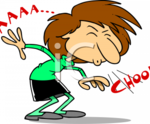Hay Fever/Allergic Rhinitis
By Beverly Mc Govern Dip. Ac., Lic. Ac., Dip. Nutritional Advisor, Dip. Chinese Herbs, ITEC., IFR.,
What is it?
Symptoms include itchy, puffy, watery eyes, sneezing and red, stuffy nose. It is an allergic reaction. It is caused by allergens entering your body via inhalation or swallowing. It is usually seasonal but can be all year round if the allergens stay throughout the year. It is your immune system’s response to allergens in the air around you.
Hay Fever can be triggered by many allergens such as dust mite, moulds, pollens, animal dander, chemicals, aerosols and many more. It affects both men and women equally. It is most common in Spring and Summer. It can be quite debilitating when it is severe and can make life quite miserable. It is particularly uncomfortable for students trying to sit exams and concentrate.
What are the risk factors?
- Family history of hay fever
- Having other allergic conditions such as eczema or asthma
- Repeated exposure to the allergen
- Nasal Polyps
- Pregnancy may aggravate Hay Fever
How Does Chinese Medicine View Hay Fever/Allergic Rhinitis?
Traditional Chinese Medicine sees this as an invasion of Wind-Cold in the meridians or channels. It is also seen as a weakness in Wei Qi (this is the body’s Defensive Energy). There may also be Lung Qi Deficiency (this is the energy that controls the body’s respiratory system). The systems at this stage are clear mucus or discharge. If left untreated it may progress to yellow or green mucus and this is invasion of Wind-Heat. The principal of treatment would be to dispel or purge Wind-Cold or Wind-Heat and boost Wei Qi and Lung Qi. This can be achieved through Acupuncture or using Chinese Herbs.
What Can you Do About it?
There is no need to suffer in silence. The first port of call should be to identify exactly what allergens are causing the problem and then to exclude them as much as possible. An Allergy Test will identify most allergens. It will also identify any vitamin and mineral deficiencies, which may exasperate the problem. For example, if you are lacking in Zinc it can affect the mucus membranes and lining of the nose. It may also result in a decline in the sense of taste and smell. Diet can also assist, by ensuring it provides all the vitamins and minerals necessary to support your immune system.
TIP: If pollens or grass are bothersome allergens for you it may help if you place some vaseline at the bottom of the nostrils before working in the garden. It will catch a lot of the air borne particles and may reduce the hay fever effect.


